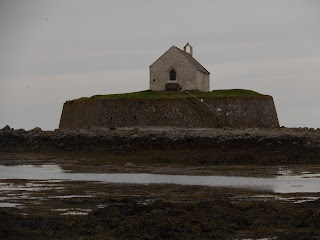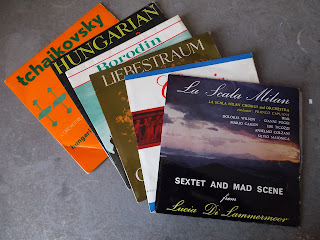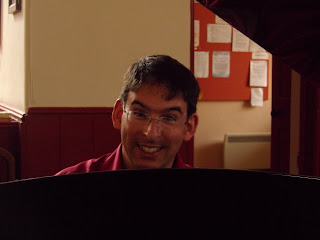St Cwyfan's Church lies perched on the small isle of Cribinau just off the coast of Anglesey near Aberffraw in North-west Wales.
Known popularly as 'eglwys bach y mor' (the church in the sea) it was built in the twelfth century (and substantially rebuilt in the fourteenth century) but has been much altered over the centuries. It is reached by walking across the causeway, and the island is usually cut off by the sea for around four hours each day.
When the church was built, the land was still connected to the mainland (as can be seen from the map John Speed made in 1636), but has been eroded over many hundreds of years.
A new church was built a mile inland in 1871 (St Mary) and the old church fell into decay. By the end of the nineteenth century, the church was in danger of being lost altogether: some of the graves had begun to fall into the sea and the building had lost its roof. We owe it to architect Harold Hughes that the present seawall was built around the island and that it was restored in 1893.
If you look at some of the photos you will find on line, you'll see that the church has in recent years been limewashed as it would have been at the time it was built.
The inside is very simple and the north wall shows signs of the north aisle and arcade added in the sixteenth century; this was demolished in the early nineteenth century as the sea eroded the island.
As can be seen, it was a grey August day when I visited the church. I was very fortunate that the church warden was on site that afternoon and so was able to gain access. Potential visitors should note that it is normally locked.
Tuesday, 30 August 2016
Tuesday, 16 August 2016
First Musical Experiences
I recently disposed of a charming (though woodworm riddled) radiogram made in 1954. It was, I think, a wedding present for my parents and when I was very small, had pride of place in their living room.
It was connected to a radio ariel on a tall pole in the garden and its list of stations connected it via shortwave to all sorts of European stations; I can remember my father fiddling to tune into the results of the American presidential elections.
Unfortunately, almost as soon as I could walk, I taught myself how to operate it in order to play LPs and 78rpm. I was enthusiastic, but none too careful and was often told off for playing 78s using an LP stylus (not good for the stylus which was made from different material to the 78rpm one).
Here's the instruction manual.
78rpm discs had just about stopped being manufactured by this time (around 1962-3), but there were still plenty around the house, and many of my father's friends and colleagues off-loaded their collections on to me (which I was overjoyed to receive). These included an acoustic recording of composer York Bowen playing Chopin's Third Ballade (rather good) or, high up in the kitsch levels, an acoustic recording of Ketélbey's In a Monastery Garden, replete with the sounds of mechanical birds. As you can see, I still have these.
There were LPs as well and many EPs - Extended Play 33rpm 7' inch discs. When my parents bought their first fridge in 1964 I quickly snaffled up ten EP discs that came with it as a special offer - Chopin piano works, Tchaikovsky's Marche Slave, Liszt Hungarian Rhapsodies, Borodin's Polovtsian Dances, the Sextet from Donizetti's Lucia di Lammermoor and piano works by Liszt among many others.
It was connected to a radio ariel on a tall pole in the garden and its list of stations connected it via shortwave to all sorts of European stations; I can remember my father fiddling to tune into the results of the American presidential elections.
Unfortunately, almost as soon as I could walk, I taught myself how to operate it in order to play LPs and 78rpm. I was enthusiastic, but none too careful and was often told off for playing 78s using an LP stylus (not good for the stylus which was made from different material to the 78rpm one).
Here's the instruction manual.
78rpm discs had just about stopped being manufactured by this time (around 1962-3), but there were still plenty around the house, and many of my father's friends and colleagues off-loaded their collections on to me (which I was overjoyed to receive). These included an acoustic recording of composer York Bowen playing Chopin's Third Ballade (rather good) or, high up in the kitsch levels, an acoustic recording of Ketélbey's In a Monastery Garden, replete with the sounds of mechanical birds. As you can see, I still have these.
There were LPs as well and many EPs - Extended Play 33rpm 7' inch discs. When my parents bought their first fridge in 1964 I quickly snaffled up ten EP discs that came with it as a special offer - Chopin piano works, Tchaikovsky's Marche Slave, Liszt Hungarian Rhapsodies, Borodin's Polovtsian Dances, the Sextet from Donizetti's Lucia di Lammermoor and piano works by Liszt among many others.
Sunday, 7 August 2016
Penllyn
I've been in York for a performance of my new piano piece Penllyn, based on the early nineteenth century hymn tune by David Jenkin Morgan (1752-1844).
Here is the original tune (above) and my own version of it.
It was included in a lunchtime concert by pianist Duncan Honeybourne (see below) as the closing item in Piano Postcards: a programme of miniatures spanning 1916 to 2016 (I was providing the piece from 2016) at York’s Late Music concert series at St Saviourgate Unitarian Chapel near to the Shambles.
The concert features pieces recorded by Duncan as part of a CD project set up by composer David Power featuring a selection of piano works by British composers written over the last century, culminating in recent pieces by David and myself (keep an eye on this blog or my website for more details when the CD is about to appear). There was also an evening concert given by the excellent Late Music Ensemble ensemble conducted by composer James Whittle who organised the day of concerts; it included a splendid new piece by David in tribute to David Bowie: Bye Bye Spaceboy.
We recorded all the pieces in York last year (see the blog I wrote then for more details), but it was never going to be possible to include the series of miniatures I wrote in the concert. This is because they do things with the piano that it is only possible to do in a recorded situation - for instance, doubling melodic lines played on the keyboard simultaneously with the same notes plucked inside the instrument, or adding many different layers of sound.
Many thanks to Duncan who gave a wonderful performance of the piece and to James for his excellent organisation of the day - if anyone is interested in seeing a copy of the new piece, do drop me an email.
Here is the original tune (above) and my own version of it.
It was included in a lunchtime concert by pianist Duncan Honeybourne (see below) as the closing item in Piano Postcards: a programme of miniatures spanning 1916 to 2016 (I was providing the piece from 2016) at York’s Late Music concert series at St Saviourgate Unitarian Chapel near to the Shambles.
The concert features pieces recorded by Duncan as part of a CD project set up by composer David Power featuring a selection of piano works by British composers written over the last century, culminating in recent pieces by David and myself (keep an eye on this blog or my website for more details when the CD is about to appear). There was also an evening concert given by the excellent Late Music Ensemble ensemble conducted by composer James Whittle who organised the day of concerts; it included a splendid new piece by David in tribute to David Bowie: Bye Bye Spaceboy.
Many thanks to Duncan who gave a wonderful performance of the piece and to James for his excellent organisation of the day - if anyone is interested in seeing a copy of the new piece, do drop me an email.
Subscribe to:
Posts (Atom)


















